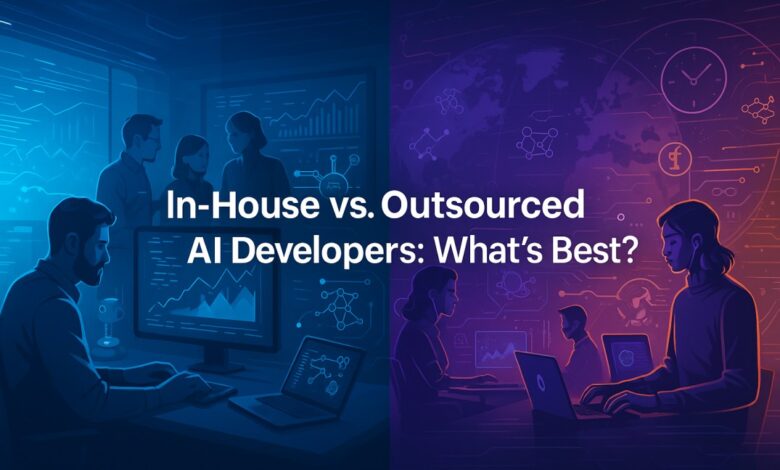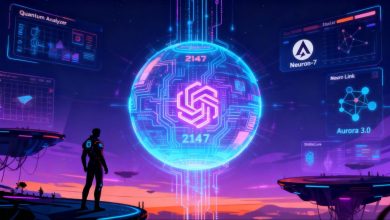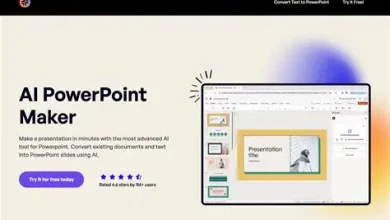
The race to integrate AI into business is no longer optional—it’s a necessity. But here’s the million-dollar question: Should you build an in-house AI team or outsource to expert developers?
For CTOs and decision-makers, this choice can shape budgets, timelines, and success. Let’s break down what matters most when deciding between in-house vs. outsourced AI developers.
The AI Talent Shortage: A Costly Reality
AI development isn’t just hot—it’s on fire. According to a 2024 McKinsey report, 58% of companies implementing AI say finding skilled talent is their biggest hurdle. And in the U.S., the average AI engineer salary is now over $164,000/year (source).
For many organizations, this cost alone makes building an internal AI team a tough call. But cost isn’t the only piece of the puzzle.
Pros of In-House AI Developers
Bringing your AI team in-house means full control. You decide who works on what, and how projects evolve. Here’s what works in favor of this model:
1. Deep Institutional Knowledge
Internal developers understand your systems, your goals, and your culture. That knowledge can translate to AI solutions that truly fit your operations.
2. Better Collaboration
Need a quick pivot during a project? In-house teams can respond fast. They’re in meetings, on calls, and usually available for instant feedback.
3. Long-Term Alignment
When you’re building AI solutions that are core to your business, long-term in-house resources offer continuity and evolution over time.
Downsides of the In-House Model
While the benefits are clear, so are the drawbacks.
- High Cost: Salaries, benefits, training, and retention bonuses can drain budgets fast.
- Hiring Delays: Finding top-tier AI talent can take months.
- Limited Expertise: One team may not cover every AI niche—from NLP to computer vision or generative AI.
Pros of Outsourcing AI Development
On the flip side, outsourcing to dedicated professionals or agencies is like adding a superpower to your team—without the HR headaches.
1. Fast Access to Experts
Need specialists in chatbot development, machine learning models, or generative AI? You’ll get access to top talent without recruitment delays.
2. Cost Efficiency
You avoid salaries, overhead, and long-term commitments. You pay for what you need—nothing more.
3. Scalability
Have a big push for Q4? Easily scale up your external team. Once things calm down, you can scale back without layoffs or stress.
The Cons of Outsourcing
Outsourcing isn’t perfect either.
- Time Zones and Communication: If your outsourced team is halfway across the world, scheduling calls can be a juggling act.
- Less Control: You’ll depend on someone else’s team, project management style, and availability.
- Security Risks: Sharing proprietary data with third parties can be risky if not handled well.
Use Case: AI Chatbots in Customer Support
Let’s say your company wants to launch an AI chatbot to streamline customer service. Should you go in-house or outsourced?
If you need quick deployment, minimal internal technical involvement, and cost-effective delivery, outsourcing is often the smarter choice. You’ll benefit from tried-and-tested chatbot development services without reinventing the wheel. Many businesses choose to hire dedicated chatbot developers for such projects to ensure faster turnaround and specialized expertise.
But if the chatbot integrates deeply with internal tools or handles sensitive customer data, building in-house might offer better oversight and data governance.
When to Choose In-House vs. Outsourced AI Developers
The right choice depends on your company’s goals, timeline, and internal capabilities. Let’s break it down by scenario:
✅ Choose In-House When:
- You’re building a long-term AI strategy tied closely to your core product.
- You need tight integration with internal systems and teams.
- You have the budget to recruit, retain, and train a full team.
- Data privacy is non-negotiable and must remain in-house.
Example: A healthcare SaaS platform building an AI diagnostic tool may benefit from an in-house team that understands regulatory compliance and proprietary workflows.
✅ Choose Outsourced When:
- You want to kick-start AI development quickly.
- You’re exploring proof of concept or MVPs.
- You need access to specialized skillsets like generative AI or NLP.
- You don’t want to commit to long-term hiring costs upfront.
Example: A retail company that wants to implement AI-based recommendation engines ahead of the holiday season may benefit from outsourcing to hit deadlines fast.
The Hybrid Model: Best of Both Worlds?
Many forward-thinking companies are blending both models. They build a small in-house core team to manage strategy, data governance, and vision. Then they augment with outsourced AI developers for execution and scale.
Advantages of Hybrid:
- Strategic control stays internal.
- Access to external talent as needed.
- Lower overhead and faster execution.
According to Deloitte’s Global Outsourcing Survey 2024, 73% of companies now use a hybrid model for tech initiatives, including AI.
Real-World Trends: AI Development is Booming
AI is growing across every sector—and fast.
- In 2025, global AI software revenue is projected to hit $800 billion, up from $142 billion in 2023 (Statista).
- 83% of U.S.-based tech leaders report outsourcing at least part of their AI initiatives to accelerate results.
These numbers reflect a reality: very few businesses can scale AI alone.
Red Flags When Hiring AI Talent
Whether in-house or outsourced, watch for these warning signs:
- No Proven Experience: Check past projects. AI isn’t guesswork.
- Lack of Business Understanding: AI solutions must solve business problems, not just “look smart.”
- Overpromising: Anyone guaranteeing 100% accuracy in predictive models is waving a red flag.
Final Checklist for Decision-Makers
Before you decide, ask these five questions:
- What’s our timeline?
Need it done in 3 months? Outsourcing might be faster. - What’s the budget?
Do you have the runway to build a full team? Or is flexible spending smarter? - How central is AI to our business model?
Core product = In-house. Add-on feature = Outsource. - What skills do we have in-house today?
Your internal data science or engineering talent may influence the decision. - Can we manage external teams effectively?
Outsourcing requires strong communication and project oversight.
Conclusion: There’s No One-Size-Fits-All
So, what’s best in the debate of in-house vs. outsourced AI developers?
If you’re building AI as a core part of your product offering, and you have the budget and time, building an internal team makes sense. But if you’re looking to move fast, minimize risk, or access cutting-edge expertise without overhead, outsourcing is a smart move.
Better yet, embrace the hybrid model—build the brain trust in-house, and rent muscle from outside when you need it.
CTOs, tech leads, and founders today aren’t just choosing between two options. They’re building flexible ecosystems that allow them to stay innovative, lean, and ahead of the curve.





